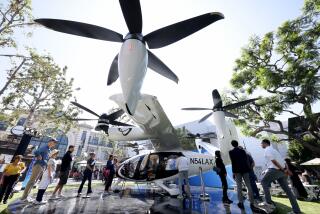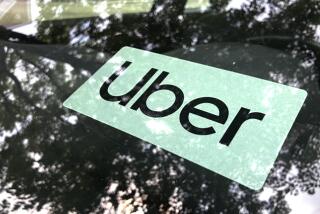COLUMN ONE : A Ph.D. for Would-Be Cabbies : London may be unique as a place where standards in a major urban service industry refuse to be eroded--as exam-plagued aspiring ‘black-taxi’ drivers know too well.
LONDON — The setting is grim, and the air stifling with tension. Six men sit on straight-backed chairs in a small waiting room, wearing dark business suits, white shirts and neckties knotted with nooselike firmness. No smile is visible here. Pulses pounding, they wait, as for the executioner’s summons.
Eventually, it comes.
“Mr. Hollands, please.”
Barclay Hollands, 24, stands up and, with as much confidence as he can muster, strides down the hallway.
“Good morning, Mr. Hollands. Be seated, please.”
Another small room, another straight-backed chair placed directly in front of a high-fronted desk behind which a man sits, hidden except for his head and shoulders.
“All right, Mr. Hollands, the London Metropole Hotel to Wormwood Scrubs Prison.”
No, this is not a sentencing, despite the inquisitional design of the setting. Hollands replies: “Harbet Road to Ducane Road. Leave by hotel forecourt. Right into Harbet Road. Left Praed Street. Left into Harrow Road. Forward the Westway. . . .”
Ten minutes later it is over, and Hollands is released to the bracing air of the street, where his elation (fist punching the air, the folds of his stylishly baggy black suit flapping maniacally) might even infect passing motorists.
“I just flew,” he says, “I just flew. Hit the elephant and went. Brilliant, boys, brilliant.”
Among his mates on the street, Hollands’ tap dance of joy is witnessed with a mix of envy and understanding, for, after 19 months of toil, he is now only a few weeks from his goal: a London cabby’s license--the green-enameled numbered medallion that hangs around every cabdriver’s neck, the symbol of his struggle with, and his eventual mastery of, The Knowledge.
There are 20,000 or so licensed cabs in London--the famous “black taxis”--and the driver of every one of them has gone through this ordeal, taking, in extreme cases, as long as five years to complete. It has been done in less than a year, but so rarely that examples of such dedication and brilliance tend to the legendary. The average struggle with The Knowledge is between two and three years.
The Knowledge is focused on an area within a six-mile radius of Charing Cross Station in the center of London and involves some 15,000 miles of twisting streets and the names of some 25,000 streets, buildings, parks, monuments, apartment blocks, pubs, hotels, subway stops--a seemingly infinite number of places, called “points” by the examiners of the Public Carriage Office.
“You will know these 25,000 points,” chief examiner-designate William Mayhew told a class of 17 appropriately daunted potential taxi drivers recently, “or you will not become taxi drivers. What you have to remember is that no one has ordered you to become cab- drivers. You will comply with our standards, and we will not lower our standards for anyone. . . .
“You are about to undertake the hardest work you’ve ever done in your life,” Mayhew told them. “Statistically speaking, about nine of you will not make it. One or two of you will be injured in the process, so seriously that you will have broken bones. Also, statistically, two of you will get divorced while learning The Knowledge.”
Grim stuff. As far as anyone here knows, the system of licensing London taxi drivers is unique, and this city is perhaps the last place in the world where the standards in a major urban service industry refuse, stubbornly and sometimes under pressure, to be eroded.
In fact, the London taxi industry now clings to The Knowledge as a prime reason to retain exclusivity in the London market. In the last 10 years, cheaper mini-cab services have eaten into the revenues of black-taxi operators, launching what some in the business refer to as “the taxi wars.”
Although a few taxi fleets do exist, most London taxi drivers are independent owners and operators and indeed cite the independence of the job as one of its leading attractions. Their cabs are all privately owned and have no connection with the government, apart from the rigorous control exerted by the Public Carriage Office, the licensing authority whose bureaucratic forebears date back to the time of Oliver Cromwell in the mid-17th Century.
The mini-cab services (which use passenger cars, ranging anywhere from economical Ford sedans to luxury limousines) began operating more than 30 years ago, largely in suburban areas where taxi service was sparse, thereby filling a vacant economic niche. Gradually, though, the mini-cab services moved into the central city, focusing on telephone orders for runs to the airports, then on getting sweetheart deals with nightclubs or hotels.
“Back when there was an economic boom, through the mid-1980s, it didn’t matter much,” said Stuart Pessok of the Licensed Taxi Drivers’ Assn. “But as times have gotten tougher, so has the competition, and that’s when the mini-cabs tried hard to make inroads into the business, working hotels, air terminals, theaters, nightclubs. They started using two-way radios. Now, the basic problem is that there is no legislation covering them.”
In the Thatcher era, when the watchword was to restrain government intervention in the marketplace, the licensed taxi industry had a hard time getting a sympathetic ear in the dispute. Now, under ex-Prime Minister Margaret Thatcher’s successor, John Major, the Transport Ministry is studying legislation that could result in some form of licensing for mini-cab drivers.
The Public Carriage Office is largely manned by former Scotland Yard police officers, and every applicant for a taxi license undergoes a rigorous background check. The mini-cab drivers are given no such scrutiny, the black-taxi drivers point out, nor are their cars made to pass any inspections.
But the argument that may carry the day for London’s licensed cabbies is The Knowledge, the trial-by-traffic and rigorous examination that drivers remember, with horror and pride, for decades after they have passed it.
“God, yes, I remember it,” said Joseph Cane, 67. “I did it 40 years ago, and I still remember it. Took me 13 months. Didn’t do anything else. Went out and made the runs on a motorbike, then sat with my mates calling over the runs. Did it 12, 14 hours a day. Had a map of London taped on the ceiling over my bed. Used to have to go to the Public Carriage Office for examinations at 6 a.m., sometimes sit there for hours. Men would get so nervous they would throw up. One man, I remember, sat there for hours, and when they called his name he stood up and fainted, dead away.”
Although the examinations now begin at the more reasonable hour of 8 a.m., Cane’s memory remains an accurate reflection of being “on The Knowledge.”
A good deal of the tension results from the demeanor of the examiners at the Public Carriage Office, who proudly quote a visitor’s remark that their office operated “like the last outpost of the British Empire.” The strict adherence to standards is, as much as anything, a matter of tradition, enforced by the Public Carriage Office and accepted by the taxi industry. When a visitor remarked that the examiners were a bit like Supreme Court justices, one of them joked in reply: “A bit higher, actually.”
The examiners all wear dark, judgelike suits to work and expect the same of the applicants showing up for an examination appearance. (Mayhew to entering applicants: “Those of you men who have various bits of jewelry hanging from your ears or other parts of your anatomy, I suggest you get rid of them before you show up here again. You are adults now, and we expect you to look like adults.”)
Applicants are given a booklet with 468 “runs” (examples: Manor House Station to Gibson Square, Gray’s Inn to Victoria Park), and before they finish, they must be able to “call over” to the examiner those 468 routes, street by street and turn by turn, following the nearest course to a straight line. The catch is that examiners seldom use the starting points or destinations listed in the book, but will name a building or street in the general area. If the applicant isn’t able to remember where it is, he misses the question. No arguments are allowed. A simple “Sorry, sir,” is the only acceptable reply.
“We’re testing their character,” Mayhew says. “We don’t want drivers who lose their tempers, who get rattled. We figure if they can take what we dish out, they can handle anything out there on the streets.”
The only way to pass the series of examination appearances, which progress at intervals ranging from 56 days to two weeks, is to get out on the streets, usually on a moped or motorcycle, and do the runs. Not only do the runs, but search out buildings and alleys and mews all along the way and surrounding each point.
“You don’t have time for anything else when you’re on The Knowledge,” said Tim Overington, 35, a former milkman who worked 90 hours a week to learn The Knowledge and hold down his milk route job. He dropped the milk route six months ago and has lived on welfare for the last, intensive push to win his license. Now, after 3 1/2 years, he is facing his final exam. Except for the driving test (which has a 51% failure rate itself) and a much less rigorous test for knowledge of suburban routes, he is getting close to receiving his license.
“You find that you lose all your old friends,” Overington said. “The only friends you see are your mates doing The Knowledge. You go out and do the runs, and then you sit down with the other guys and take turns calling over. That’s all you have time for.”
Overington has buddied up with John Howard, 26, and Sim Yiannikaris, 30, and they meet every day before noon at the Mann and Overton “knowledge school” (one of several such enterprises) located near the Public Carriage Office, where they spend a few hours sitting over a tabletop map of London, practicing for their appearances before the fearsome examiners. Howard is now on 28-day intervals, Yiannikaris on 21 days.
“It’s terrible before an appearance,” Howard said. “You have trouble sleeping for a week before. You walk around muttering the names of streets to yourself. It’s not only you that suffers, it’s your family too.”
“A lot of people underestimate it,” Yiannikaris said. “They say learning the London Knowledge is like learning a Ph.D. You are supposed to know everything out there, everything that is of public interest. Sometimes you do these runs 15, 20 times. It’s hard to believe, but eventually it begins to stick.”
None of these three have been seriously hurt riding their motorbikes around the London streets, but they’ve been run off the road and over curbs, soaked and splattered for hours in London’s sopping weather, trying to cram every point possible into their memory.
Why do it? It’s good money. Officials at the Public Carriage Office estimate that the average taxi driver can earn about 10 pounds ($17) an hour. Aspiring drivers hope that’s conservative.
“My wife’s uncle drives a taxi,” said P. E. Evans, 30, who is also, he hopes, weeks away from his last Knowledge exam. “Last week he made 900 pounds, and that was with no weekends and no late nights.”
“It gives you a lot of independence,” Howard said. “Where else can you earn good money and set your own hours? You want to take the morning off and play golf, you can do it. You want to work, you can do it.”
“The three of us here,” said Overington, indicating his two study companions, “we’re working-class guys. It’s a good way up for us. You know, I should have studied this hard when I was in school.”
Overington wears a gold chain around his neck, tucked inside his sweat shirt. On it dangles a gold replica of--naturally--a taxicab.
“If I studied this hard when I was in school, I could have been a lawyer or something. But when you’re in school, you don’t care about anything. So now,” he shrugged, “I’ll be a taxi driver. That’s pretty good, I think. When I’m finished, I’ll be proud.”
More to Read
Sign up for Essential California
The most important California stories and recommendations in your inbox every morning.
You may occasionally receive promotional content from the Los Angeles Times.










